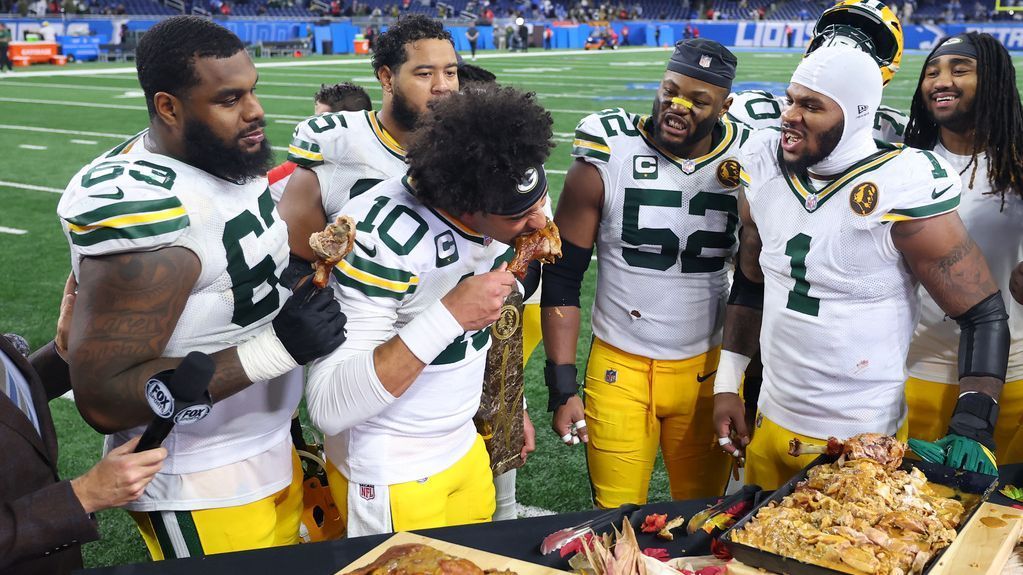
Paolo UggettiOct 24, 2025, 07:30 AM ET
MICHAEL JOHNSON WAS trying to find a way home.
In 2019, Johnson was the executive chef of the Seattle Seahawks, but he wanted to get back to Baton Rouge, where his children and their mother lived. One late night, Johnson dove into a job search that yielded a surprising result.
"I googled 'executive chef Baton Rouge,' and the first job that popped up was a listing for the executive chef of LSU Athletics," Johnson said. "I like to tell people that God found me this job."
Johnson had applied for a culinary position with LSU before where he would be working at Tiger Stadium, but LSU's response was that he was overqualified.
This new gig looked perfect, but first, Johnson had to prove himself. As part of his interview, he cooked for 35 people -- executives, dieticians and other high-ranking LSU officials. Johnson served up his best: a carved tenderloin and Carolina-style barbecue shrimp and grits with a tomato broth to show how he could make comfort foods a little healthier, plus several other dishes that were Louisiana-themed with a twist. The feedback came quickly.
"I remember [executive deputy AD] Verge Ausberry asking me questions like 'Why did you hold back the salt on this?'" Johnson said. "It was an intense moment, but I just remember smiling all the way through it. Even when I was being grilled, I was so happy to be there and had all the confidence."
Less than an hour after the demo, LSU offered Johnson the job.
In the six years since, Johnson has helped head up the LSU performance nutrition center, which opened in July 2019, has around 50 employees -- 35 of them report to Johnson -- and feeds athletes three meals, five days of the week. For the first three years of his time in Baton Rouge, Johnson also traveled with the football team to ensure quality control.
Now, Johnson stays back and helps manage the extensive operation, which is a collaborative effort among him, his four sous chefs and the four dieticians (one exclusively for football) on staff. Johnson's job can also extend to include meals for recruiting visits and donor events, but his biggest task may be menu creation in a way that caters to everyone.
Johnson is one of a handful of executive chefs around the country who work directly with a college football team or athletic program. His headshot, along with the sous chefs', is featured on the school's athletic directory. A search through Power 4 school directories revealed that only 21 programs publicly feature a chef of some kind on their staff, and only 10 of those are in-house employees, including chefs at Colorado, Georgia, Clemson and Missouri.
Today I learned that LSU puts the team chefs on the athletics website like they're on the team. And that's why LSU athletics is one of our greatest national treasures https://t.co/a5MtULtYG7 pic.twitter.com/kxxtyKUame
— Rodger Sherman (@rodger) June 5, 2024"To be treated as an equal is everything," Johnson said. "I've never felt like I wasn't part of the team."
What is largely a behind-the-scenes job, chefs at top-tier programs often work 10-12 hours a day, helping cook hundreds of meals while managing quality, a budget, evolving nutrition plans for athletes and the vexing challenge of pleasing people's palates.
"I have gumbo on the menu every Monday, and it's because I like my job," said Johnson with a laugh. "It wasn't an ask, it was a demand."
CARL SOLOMON HAS worked in the restaurant business since he was 15 years old. He has cooked at fine-dining establishments from Portland, Oregon, to Denton, Texas, and his Instagram, which showcases the various farm-to-table dishes he crafts, is as clean as his plating. Yet nothing could have prepared him for becoming Deion Sanders' personal chef.
That is not Solomon's official title -- that would be executive chef for Colorado Athletics -- but it has become a part of his role. Their relationship is such that Solomon now makes Sanders' meals two to three times a day.
"He comes into the kitchen daily, like hooting and hollering," Solomon said. "He's just an incredible human in every regard, and I get a lot of daily feedback and interaction from him."
So what does Prime like to eat? Local, marinated roasted chicken. Well-done steak -- high-quality New York strips that Solomon and his team cut and prepare in-house. Yellow rice, some broccoli, asparagus, watermelon and for dessert, a red velvet cake, cupcake or a chocolate chip cookie.
"He's a man that knows what he wants," Solomon said. "Which makes it a little easier for me to keep him happy."
For a chef who had used the kitchen as a creative canvas, there was a learning curve for Solomon, who realized that variety and upscale were not always the goal when it came to Sanders. It's emblematic of the progression Solomon has had to make over the past six years on the job as he orchestrates a system that produces roughly 800 meals a day for 330 student-athletes and about 250 athletics staff members, sometimes six days a week. The past five of those years for Solomon have come as an in-house Colorado employee -- a change that he says made a dramatic difference.
"It's huge, because I'm here every day, I'm serving the same folks every day," Solomon said. "So I have accountability to these people I see, and my name is on this operation. That just creates this extra level of commitment and dedication you might not get otherwise."
Solomon's commitment and expertise can be seen in how he has set up every aspect of the dining experience. While others may gravitate toward a buffet setup, Solomon's team cooks everything fresh and in smaller batches. The front-of-house staff Solomon manages serves the food banquet style, meaning each hot food plate is put together by a member of the team.
"I'm always on top of that, making sure we're plating those plates nicely," Solomon said. "I'm really proud of the fact that we bring all those fundamentals that a good restaurant has run on, we bring that to this setting."
Then there's the food itself. Solomon gets ample freedom to design his menus, which he crafts based on several factors, including locality, what's in season and pricing. He also considers, as he puts it, the varying palettes and needs of a 300-pound football player versus a 100-pound track athlete.
"I'm looking for new stuff all the time," Solomon said. "I'm very lucky in the sense that being able to do that in this setting is rare, and I take full advantage of that."
The result is a bustling food hall with different daily options that get adjusted based on which sports are in season and which are not. And if an athlete isn't feeling the taco bar on any given Tuesday, Solomon and his sous chefs are open to preparing them a made-to-order special item.
"We aren't just putting out really high-quality food or great ingredients," Solomon said. "We're also tailoring it to specific athletes' needs all day every day."
Sanders' arrival in Boulder three years ago and the attention it brought to the program trickled down to here, too, giving Solomon the kind of flexibility that allows him and his team to fabricate meats internally and source top-notch ingredients.
"That's another big impact that we've seen since [Sanders] has been here -- I have a lofty budget," Solomon said. His team has grown from five cooks to 12 in the past few years.
(Clemson executive performance chef Dalton Ledford, estimated the food budget for a high-profile football program alone can range anywhere from $2 million to $3 million per year, if not more.)
The responsibility that comes with the extra resources is one Solomon cherishes and tries to pay forward with local businesses and vendors. Recently, he made a connection with a local mushroom farmer who grows "some of the best gourmet mushrooms in the state" out of a train car that he refurbished. Anything to make a dish, a meal and an entire operation just a little bit better.
"I think we put out great food, of course I'm biased, but I have been around the block, and I have done my research, and I go out to eat all the time myself," Solomon said. "I'd put us right up there with any restaurant in the city."
MONDAY NIGHTS IN Athens, Georgia, are reserved for victory meals.
Kirby Smart's team gathers around as executive chef Brandi Allen and her staff go all out and treat the team to a feast that includes items such as ribeyes, lobster tails, lobster mac and cheese and often a special dessert.
"This is Georgia," Allen said. "So we don't lose a lot of games."
Since 2021, the Bulldogs have lost a total of five regular-season games in five seasons, four of which have been to Alabama, which beat Georgia 24-21 earlier this season in Sanford Stadium. In the aftermath, Allen had no choice but to change up the plans for Monday's meal.
"We just turned it into a grill day with a more chill, laid-back vibe," Allen said. "It was a bad game, but it's not the end of the world."
Allen, who has a culinary school degree and a background in cooking competitions, has been working for Georgia in some capacity going on 14 years now. Until this June, she was working exclusively in general dining services before she was handpicked to cook for the football program after the previous chef moved on to a job in the NFL.
Though she didn't have a background in nutrition or working with athletes, Allen jumped into the job with eagerness. She took time to research what went into being a performance chef, met with the program's culinary manager and team dietician, and most importantly, spoke with the players. If she was going to revamp the entire menu and program, she needed to know what her audience needed and wanted to eat.
"These are 18- to 20-year-old kids, honestly. It's never a good idea to go too fancy -- you gotta keep it simple, but also delicious," Allen said. "So it's figuring out ways to incorporate that into the diet so it's beneficial to them and that they enjoy eating it."
Allen tried to make sure players' input was heard and that they knew what they were going to be eating and why. It helped that the feedback she received was easy to incorporate -- after all, her background and specialty was in exactly the kind of cuisine more players were requesting. As Allen puts it: "comforting food for the soul."
"We have a lot of Southern boys on our team and that is their background as well with comfort foods and Southern cuisine that their parents cook for them," Allen said. "A lot of them miss home and they miss their parents' cooking. We try to give them a home away from home."
Football players, she says, are not "vegetable kids," so she gets creative with meals, adding peas, green beans, broccolis and carrots to carbs as opposed to having them by themselves. Allen also divides the entire team into three buckets: those who need to lose weight, those who need to maintain weight and those who need to gain weight, providing different protein options for all of them.
After discussing with the team dietician, who is in contact with Smart about the cadence of any given practice week, Allen landed on a four-week cycle of different menus specifically crafted for the team. Then, she pays close attention to what players like and don't like in order to adjust.
"It's one of the biggest reasons why I kind of sit with them and ask them what it is that they would want to see on the menu," Allen said. "That way I can try to make it more appealing to them so that they come and eat with us versus eating out."
Allen knows she can't please them all as she tries to make food for about 150 people a day, including staff and coaches, but she tries. So far, her jalapeño ranch fried chicken wing has been a runaway winner.
"It's a hit, they love it," Allen said. And the Georgia coaching staff? "They say it's the best chicken in town."
DALTON LEDFORD HAS been the executive performance chef at Clemson for three years. He has fed hundreds of players, seen many go on to the NFL, been part of two ACC titles and one College Football Playoff appearance. But his greatest accomplishment?
"It's getting Coach [Dabo] Swinney to not eat a well-done steak," Ledford said. "I finally talked him into eating a medium steak and he said, 'Hey, it wasn't leathery!'"
A lifelong Clemson fan, Ledford grew up working at Sticky Fingers, his dad's rib joint in Fountain Inn, South Carolina. He went on to serve $300 plates at a five-star resort in Colorado Springs, Colorado, before landing back in his home state, where his excitement about the fact that he gets to cook for Swinney and the football team he roots for on Saturdays is palpable.
"Tajh Boyd is my favorite player ever," Ledford said. "I remember fourth-and-16 like it was yesterday."
When the previous executive chef left the program in 2023, Ledford. who was then working as a sous chef, but not in-house, volunteered to come up with menus for fall camp. One day, Swinney asked to talk to him. A scared Ledford thought his food had gotten someone sick and he was in trouble. He wasn't. Swinney wanted to know if he'd be interested in the executive chef position. Ledford balked -- he hadn't attended culinary school and didn't have a degree in nutrition. He told Swinney that he didn't feel qualified.
"And the exact words Coach told me was, 'Do you think I was qualified to take over the head coach job when I did?'" Ledford said. "He said, 'I was young, I didn't understand all of it yet, but I was given an opportunity and I was going to try my best in that opportunity to do everything I can for this program. You'll figure it out. I trust you.'"
Like Allen at Georgia, Ledford works hand-in-hand with team dieticians to cater specifically to the football team and staff in the football operations building. Every player has access to an app called Notemeal, which Ledford uses to input the daily menu and macronutrients for each meal, and it allows players to order lunch in between classes or meetings.
But Ledford wanted to go beyond simply feeding the players; he wanted them to learn how to feed themselves, too. In the football facility kitchen, Ledford began hosting three-hour cooking demos once a month, showing players how to make everything from pizza to sushi to hibachi to grilling on a Blackstone.
"It's a skill these guys are learning, but also for those that do get to go on to the next level, they already kind of have a base," Ledford said. "If you're a late-round pick, you really don't have the money after taxes and depending on what state you live in and stuff like that, you don't always have that available to you to be able to hire a chef and a nutritionist."
At first, only 10 players participated. Now, attendance ranges from 60 to 70 players who take pride in showing Ledford a picture of a protein bowl or some other meal they made at home. It's not just the players -- coaches and staff members have wanted to get in on the experience, too.
"I did hibachi with the guys on Blackstone, and man, I had so many coaches come out and be like, 'Yo, can I jump in with them and learn how to make this? I want to learn,'" Ledford said. "It ends up being a bonding moment between all of them."
The demos, along with Ledford's day-to-day food, also play a key role in recruiting. Ledford and his staff do all the food for recruiting events in-house, and when there is a player visiting campus with his parents, the recruiting staff has asked that Ledford meet with them to showcase their culinary experience.
"I always make the joke that Coach Swinney is going to make them into a man, and I'm going to feed 'em like it," Ledford said. "A lot of these kids are coming from other states, across the country, across the world sometimes. As a parent, you want to know that you've got a group of people that are not just looking out for them on the field, but off the field, too."
MISSOURI HEAD COACH Eli Drinkwitz does not have a difficult palate to please. But Joe Moroni, the Tigers' executive performance chef, knows the one thing that Drinkwitz is particular about.
"He loves crispy bacon," Moroni said.
Moroni knows all too well how things can get complicated inside a kitchen depending on who will be eating the meal he's preparing. Moroni honed his craft in the Army as a cook and a staff sergeant for 11 years, eventually working his way up to the Pentagon, where he worked for the Joint Chiefs of Staff and concocted meals for an eclectic list of visitors including the New York Yankees, the Princess of Jordan and Robert De Niro.
After his stint in the Pentagon, Moroni was then selected as a general's aid to four-star general Keith B. Alexander, whom he followed to the National Security Agency -- where he cooked for Alexander and many foreign diplomats -- until 2006, when Moroni moved back to Missouri.
Eventually, Moroni applied for a sous chef position in campus dining at Mizzou before ascending to his current position where he helped create a role that oversees all of athletic dining with an emphasis on football. Drinkwitz's team gets an exclusive menu, meals six days a week and their own dining area on the south end of Faurot Field; it's a nonstop affair and Moroni is right at the center of it.
"It's a unique job. It's one of those things that there's just no schooling out there for it," Moroni said, adding that his team is feeding someone at least 48 weeks out of the year. "I'll tell you what, I had more days off at the Pentagon."
Moroni now lives and dies with every Tigers football game, in part, because it determines what his job may look like on a given week. If Mizzou loses, the team usually gets a catered meal from an outside restaurant Sunday to avoid food fatigue. If they win, they get the catered meal plus a bonus -- be it as extravagant as a filet mignon or as simple as a build-your-own nacho bar.
"We basically look at it like there's 12 victories. So if those victories are victories, then we have 12 extravagant meals that they're going to get," Moroni said. "We all know that that doesn't always happen. So if they don't win, then we basically roll that victory menu to the next week, and we still feed them."
Beyond the customary work with dieticians, Moroni, much like Allen at Georgia, takes pride in doing his research on the team ahead of a football season, talking to players about where they're from and what foods they like. Whenever possible, he and his team will try to incorporate foods from specific regions of the country where a certain player may be from to provide a nostalgic meal.
"If I have somebody who's coming from New Jersey, we might be trying to source something from the coast of New Jersey," Moroni said. "Or if it's someone from Texas and they're looking for something like a specific type of way of cooking a brisket, we try to do those kinds of things."
Moroni may no longer have the highest security clearance he once had in Washington D.C., or the chance to cook for dignitaries and celebrities. But in Columbia, he has witnessed firsthand how his cooking has brought teams and people from different parts of the country or the world together. Food is a love language for him just as it is for Solomon, Allen, Ledford and Johnson -- the long hours they put in is in service of not just plying their craft, but creating those moments when a player sits down after a long day of practice and finds bliss in a bite of food.
"At the end of the day, we all want to feel loved, we all want to be warm, we all want a full belly," Moroni said. "I never really got interactions with those particular celebrities. Whereas I cooked for [Mizzou QB] Brady Cook for four years, and I knew [linebacker] Nick Bolton and his mannerisms. And you get to know these people on a personal basis, you know what they like and don't like, how they like to be, what their different mannerisms are when they win, how you help make them feel better if they drop that pass or had that fumble. So yeah, I like cooking for who I cook for right now."
.png)
 4 months ago
58
4 months ago
58

















































